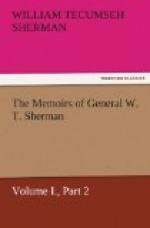At that date, July 4, 1861, the rebels had two armies in front of Washington; the one at Manassas Junction, commanded by General Beauregard, with his advance guard at Fairfax Court House, and indeed almost in sight of Washington. The other, commanded by General Joe Johnston, was at Winchester, with its advance at Martinsburg and Harper’s Ferry; but the advance had fallen back before Patterson, who then occupied Martinsburg and the line of the Baltimore & Ohio Railroad.
The temper of Congress and the people would not permit the slow and methodical preparation desired by General Scott; and the cry of “On to Richmond!” which was shared by the volunteers, most of whom had only engaged for ninety days, forced General Scott to hasten his preparations, and to order a general advance about the middle of July. McDowell was to move from the defenses of Washington, and Patterson from Martinsburg. In the organization of McDowell’s army into divisions and brigades, Colonel David Hunter was assigned to command the Second Division, and I was ordered to take command of his former brigade, which was composed of five regiments in position in and about Fort Corcoran, and on the ground opposite Georgetown. I assumed command on the 30th of June, and proceeded at once to prepare it for the general advance. My command constituted the Third Brigade of the First Division, which division was commanded by Brigadier-General Daniel Tyler, a graduate of West Point, but who had seen little or no actual service. I applied to General McDowell for home staff-officers, and he gave me, as adjutant-general, Lieutenant Piper, of the Third Artillery, and, as aide-de-camp, Lieutenant McQuesten, a fine young cavalry-officer, fresh from West Point.
I selected for the field the Thirteenth New York, Colonel Quinby; the Sixty-ninth New York, Colonel Corcoran; the Seventy-ninth New York, Colonel Cameron; and the Second Wisconsin, Lieutenant-Colonel Peck. These were all good, strong, volunteer regiments, pretty well commanded; and I had reason to believe that I had one of the best brigades in the whole army. Captain Ayres’s battery of the Third Regular Artillery was also attached to my brigade. The other regiment, the Twenty-ninth New York, Colonel Bennett, was destined to be left behind in charge of the forts and camps during our absence, which was expected to be short. Soon after I had assumed the command, a difficulty arose in the Sixty-ninth, an Irish regiment. This regiment had volunteered in New York, early in April, for ninety days; but, by reason of the difficulty of passing through Baltimore, they had come via Annapolis, had been held for duty on the railroad as a guard for nearly a month before they actually reached Washington, and were then mustered in about a month after enrollment. Some of the men claimed that they were entitled to their discharge in ninety days from the time of enrollment, whereas the muster-roll read ninety days from the date of




